The Global Korea Scholarship 2026 is open now for international students. The program is also called KGSP by some students. This scholarship gives full support so students can study in Korea. It pays tuition and living costs and gives money for travel and language training. Students should read the official requirements before they apply. Follow the requirements of your local Korean Embassy. Some embassies may ask for documents even though the main application is online.
All applicants must apply online at the Study in Korea website. The website is the official place to register and upload documents. If your Embassy asks for extra documents send them as the Embassy requests. Missing a document or not following local requirements can make your application fail. Check every step before you send your files.
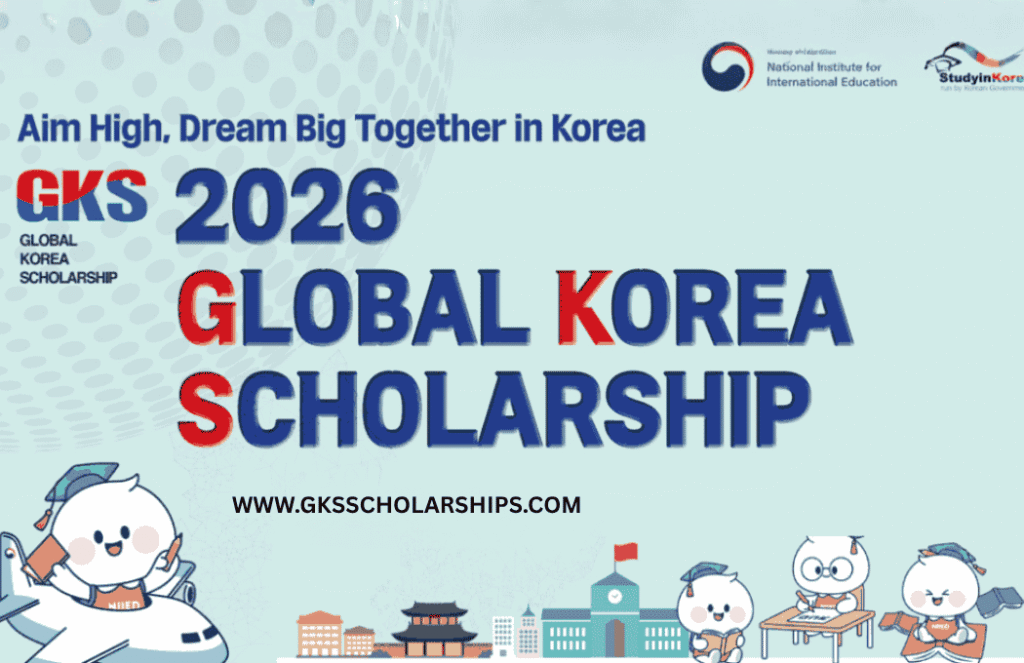
About the GKS Scholarship
- The GKS 2026 is run by NIIED which is part of the Korean education ministry.
- The goal is to bring talented students from many countries to Korea.
- The scholarship covers schooling costs and gives money for living.
- It also helps students learn Korean and join Korean life.
- The program aims to build friendships between people from different places.
- It wants to train future leaders who can work across borders.
- The program helps universities and industries connect with students from around the world.
The scholarship gives money and support so students can focus on learning. It also promotes cultural exchange and academic cooperation. Universities use the program to find international students who can contribute to research and projects. The scheme helps students make networks that last after graduation.
Scholarship duration
The length of the GKS Scholarship depends on the degree you choose. Most students begin with one year of Korean language classes. After that they start their degree program. The total time differs by major and by university.

- Bachelor degree
- The bachelor path usually lasts 5 to 7 years.
- The first year is intensive Korean language training.
- After the language year students start their undergraduate courses.
- The degree years last from four to 6 years based on the field of study.
- Engineering and science often take about four years after the language year.
- Medicine or architecture may need 5 or 6 years after the language year.
- Associate degree
- The associate program normally takes 3 to 4 years.
- The first year is also Korean language training.
- The following two to three years are for associate level courses.
- Some technical or applied programs may need extra project work and this can add time.
- Language training exemption
- If you already hold TOPIK Level 5 or Level 6 you can skip the language year.
- In that case you start your degree right away. This saves one full year and can help you finish sooner.
Scholarship benefits
The Global Korea Scholarship (GKS) is fully funded. It pays most costs so students do not need to worry about money. The support includes travel tuition language tuition monthly allowance and other help.
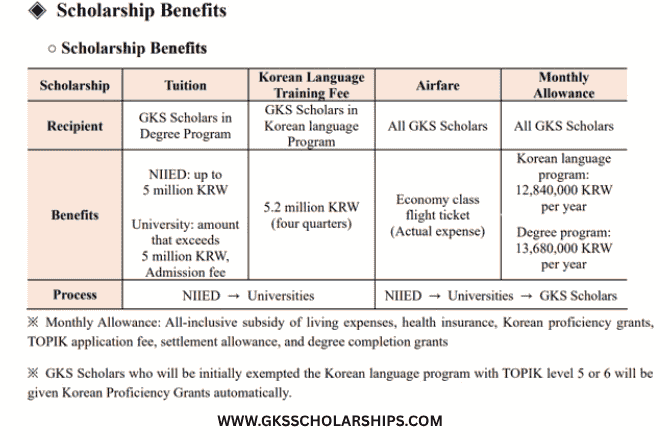
- Travel and tuition
- The scholarship gives a free round trip flight at the start and at the end of the program.
- Tuition fees are covered up to 5 million KRW each semester.
- If tuition is higher the host university pays the rest. This means students do not pay extra for normal tuition.
- Korean language training
- GKS provides one full year of Korean language classes at a certified institute.
- The language year helps students adapt to life in Korea and to study in Korean.
- The training improves listening speaking reading and writing. It also helps students build simple daily life skills for living in Korea.
- Monthly allowance
- During the language year students receive around 12.84 million KRW per year.
- During the degree years the annual allowance is about 13.68 million KRW per year.
- Monthly payments range from one million to one point five million KRW. This money helps pay rent food transport and study materials.
- Extra support
- The scholarship gives one time settlement money to help with first month expenses.
- There is a completion grant when you finish your degree.
- Research funds help with printing a thesis and buying books.
- Health insurance covers basic medical needs while you study.
- There is a bonus for students who reach TOPIK Level 5 or 6 while studying.
Eligibility Requirements
You must meet all eligibility requirements before you apply. The requirements check nationality academic records age and health. A small mistake can make your application invalid so read the guide carefully.
- Nationality
- You must be a citizen of a country listed by NIIED.
- Both parents must be non Korean.
- If you have Korean citizenship you cannot apply.
- The UIC program accepts students from any country.
- Always check the list for your country and confirm with the Embassy.
- Academic standards
- You must meet one of the grade or CGPA requirements.
- You need at least 80 percent average or be in the top 20 percent of your class.
- Or you can meet one of the GPA items below.
- GPA 2.64 out of 4.0
- GPA 2.80 out of 4.3
- GPA 2.91 out of 4.5
- GPA 3.23 out of 5.0
- For example a 3.0 out of 4.0 meets the requirement. If your school uses another scale you should convert your GPA according to the official table.
- Education requirements
- You must finish high school by December 31 2025.
- This requirements applies to both bachelor and associate applicants.
- If you already hold a bachelor degree you cannot apply.
- If you are still in school you must submit proof of expected graduation and later provide the final certificate.
- Age limit
- You must be under 25 years old. Applicants should be born after March 1, 2001 to be eligible. This age requirements is strict for the undergraduate track.
- Health check
- You must be physically and mentally fit to live and study abroad. The program requires basic health and fitness to avoid problems during long stays in Korea.
- Who cannot apply
- If you graduated from a Korean high school or a Korean online program you cannot apply.
- If you already received a Korean government scholarship for a degree you are not eligible.
- You must not apply to more than one track or to multiple universities at the same time.
You can see the complete eligibility criteria from here.
Scholarship quota for 2026
There are 280 scholarships for undergraduate study in 2026. The seats are split between the Embassy Track and the University Track. Each track has its own requirements and limits.

| Track | Seats | Notes |
| Embassy Track | 150 | General 82, Overseas Koreans 7, Regional GKS 61 from 56 countries |
| University Track | 130 | Associate 30 from 71 countries, UIC 100 open to all countries |
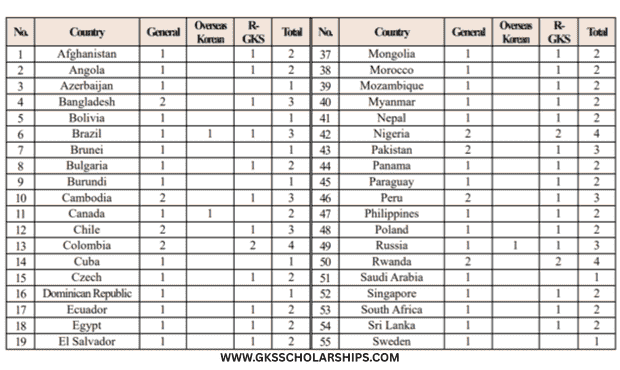
- Each country has its own quota so contact your local Embassy to know the number for your country.
- The University Track focuses on industry linked training and practical skills.
Universities and fields of study
You must choose your university and major from the official University Information list. The list is available on the Study in Korea site under the GKS Notice. Pick only programs that the list shows for your track.
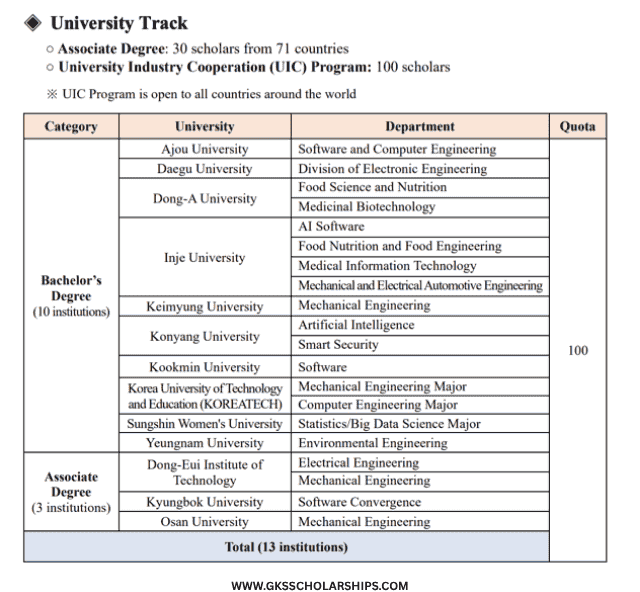
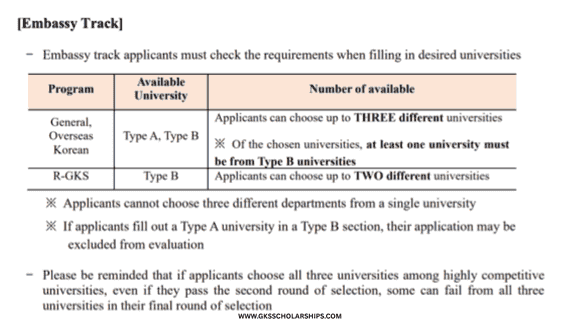
- Embassy Track requirements
- General and overseas Korean applicants can select up to three universities.
- Your list must include at least one Type B university.
- Regional GKS applicants can select up to two universities and both must be Type B.
- Type B usually means a university outside a major city.
- University Track focus
- The University Industry Cooperation program focuses on natural sciences engineering and industry linked study.
- This track includes hands on training field work and internships that connect study to real jobs.
How to apply for GKS
The application process has clear steps. Follow each step carefully and start early so you have time to get documents and recommendations.
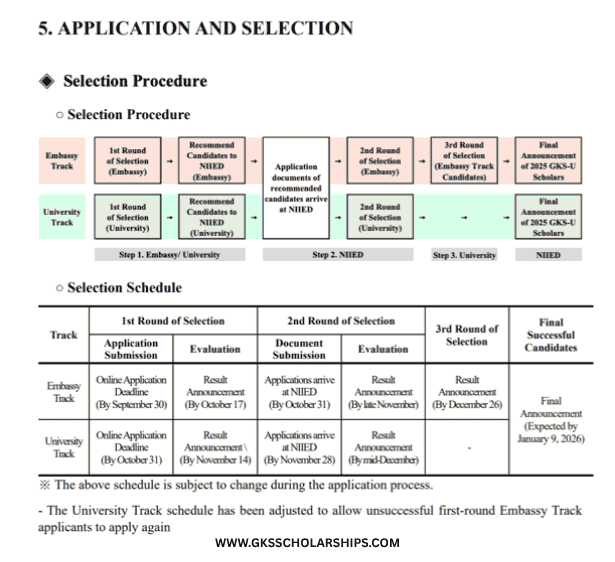
- Step one register online
- Go to www.studyinkorea.go.kr and create an account.
- Read the instructions on every page before you fill the form.
- The portal lets you save and continue your application.
- Step two complete the application
- Fill out the form with correct details.
- Upload all required documents as the guide lists.
- Check each file to make sure the scans are clear and the pages are in order.
- Step three extra documents
- Some universities may ask for extra items like recommendation letters portfolios or project work.
- If a university asks for extra documents send them directly to the university as they instruct.
- Do not just upload these to the portal if the university asks for direct submission.
Important reminder
- Each university may have its own requirements and extra conditions. Check the university requirements before you choose your school and major.
Required documents
You must prepare two groups of documents. One group is the forms you fill online. The other group is verified certificates and proofs that show your records and identity.
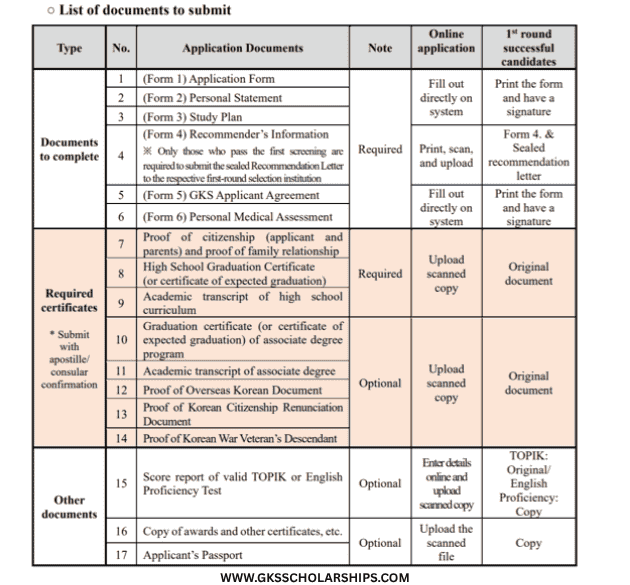
- Core application documents (portal requires these forms)
- GKS Applicant Agreement that shows you accept the requirements.
- Application Form with your personal and academic details.
- Personal Statement where you tell your story and reasons to study in Korea.
- Study Plan that explains your goals and future career plans.
- Personal Medical Assessment with your health details.
- Recommendation Documents with details of your recommender and the formal letter.
Simple tips for writing essays
- Be clear about what you want to study and why.
- Explain how the program helps your future.
- Show why Korea and your chosen field suit you.
- Certificates and proofs (must upload these official documents
- Graduation certificate or proof of expected graduation from your school.
- Academic Transcript that shows grades and GPA and the grading scale if available.
- Proof of citizenship such as a valid Passport or national identity card.
- Overseas Korean documents only if you apply under that category.
- Recommendation materials
- Recommender information Form 4 is available in the system and must be filled.
- Recommendation letter must be signed sealed and on official letterhead if possible.
How to submit documents
You must pass two rounds of checks. Each round has strict requirements, so follow the guide.
- Step one first round
- Upload all items to the Study in Korea website.
- Embassies or universities check your files for format and completeness.
- If pages are missing or scans are unclear your application may be rejected.
- Fix any mistakes quickly if your Embassy allows resubmission.
- Step two final review by NIIED
- Only applications that pass the first round go to NIIED.
- NIIED checks that your documents follow the exact format and rules.
- If your package does not meet the standards you will not advance to the next stage.
Embassy Track vs University Track
Know the difference so you can pick the best path for you. Each track has different requirements for selection and submission.
- University Track
- The track includes the UIC program which focuses on science engineering and real work experience.
- You can apply to only one university.
- This track works well if you already know which university you want.
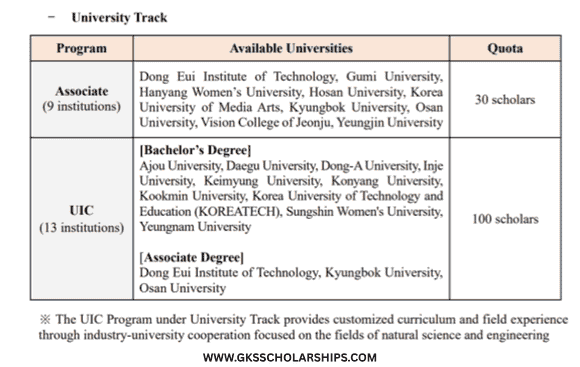
- Embassy Track
- You can apply to up to three universities. At least one chosen university must be Type B.
- Check the local Embassy requirements because they may add steps or require extra documents.
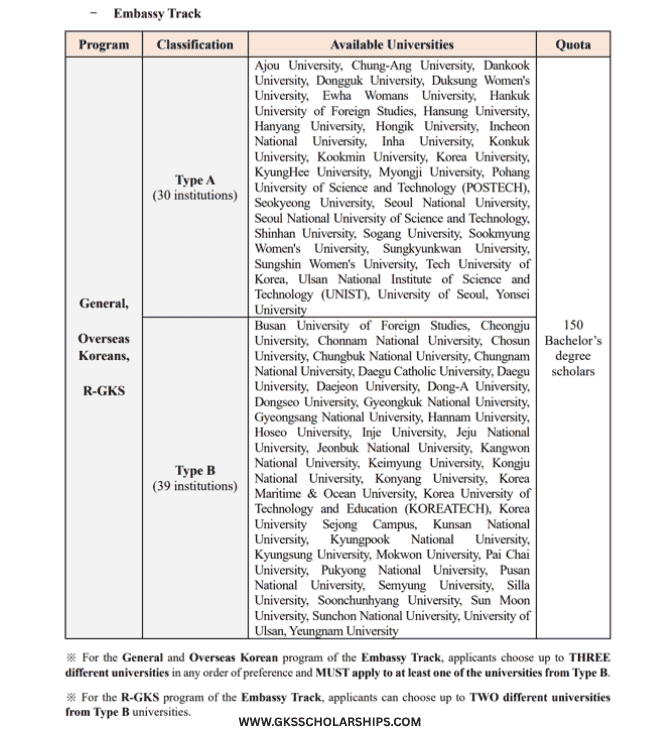
Selection timeline and evaluation
The selection process is multi stage. Reviewers check eligibility then evaluate your documents and skills. Some applicants may be called for an interview.
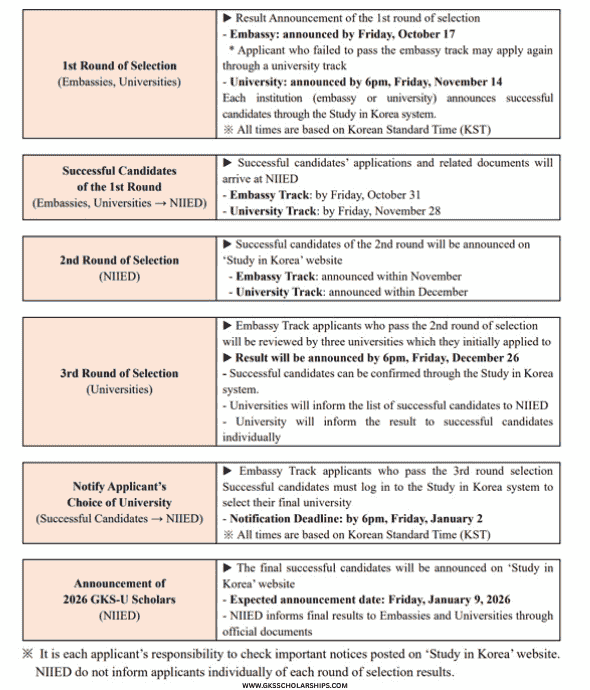
- qualification check
- The first step checks basic requirements like nationality, age, GPA and education status.
- Only those who pass every condition move to the next stage.
- competency review
- Reviewers read your personal statement study plan and recommendation letters carefully.
- Some applicants are invited for interviews.
- Interviews check your motivation communication and fit for the program.
- bonus points
- You can get extra points for certain conditions.
- TOPIK Level 3 or higher gives plus ten percent.
- Being a descendant of a Korean War veteran gives plus five percent.
- Applying for science or engineering gives plus five percent.
- These extras help reward language skills historical ties and priority study fields.
- You can get extra points for certain conditions.
- language scores
- You can submit TOPIK TOEFL or IELTS scores. The score table shows how much each test counts.
| Score weight | TOPIK level | TOEFL iBT | IELTS band |
| 100% | Level 5-6 | – | – |
| 90% | Level 4 | 114+ | 8.0+ |
| 80% | Level 3 | 95+ | 7.0+ |
| 70% | Level 2 | 72+ | 6.0+ |
| 60% | Level 1 | 42+ | 5.0+ |
Notes on scores. Tests must be taken within two years of the official announcement. If you submit more than one score the highest score is used. If you do not have a test score reviewers pay more attention to your essays.
Evaluation preferences
Some groups may be prioritized during selection. This helps meet program goals and national plans.
- Overseas Koreans who want to reconnect with their roots.
- Students from low income or underrepresented groups.
- Applicants in science and engineering fields.
- Associate degree candidates who have national skill contest awards.
- Students with strong English through high TOEFL or IELTS scores.
- Applicants in fields that support regional growth or industry zones.
- Nominees supported by local leaders such as mayors or governors.
GPA conversion and grading
Schools use different grading systems so NIIED provides a conversion table. Include your school grading scale if you can. Add a short note to explain how grades are calculated. This helps reviewers compare your record fairly.
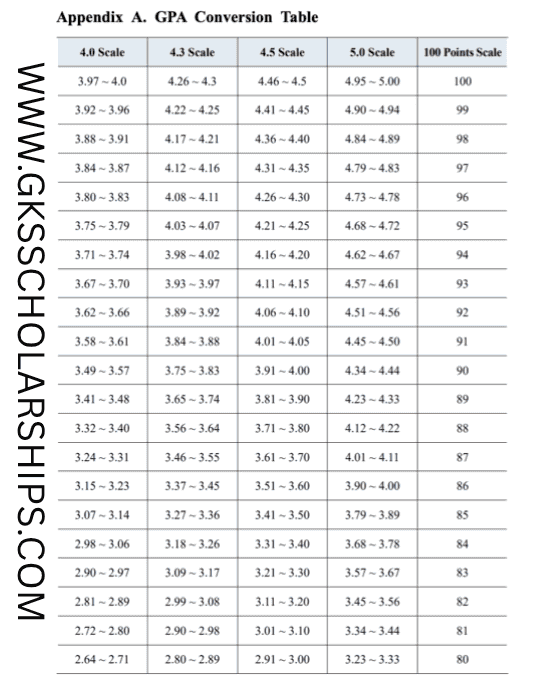
Practical tips for a strong application
These tips help you prepare a clear and correct application. Start early so you can collect documents and get recommendations. Follow the format requirements for files and translations. Make sure your name dates and ID numbers match across all documents. Choose universities and majors that fit your goals and background. Write clear essays that explain your plan and your reason to study in Korea. Practice short answers for interviews and be ready to explain your study plan and motivation.
Conclusion
The Global Korea Scholarship 2026 is a major opportunity to study in a country known for education research and innovation. The scholarship covers most costs and gives a clear path with language training and academic support. Careful preparation and honest motivation make your application stronger. Stay organized follow the requirements and believe in your ability to grow. Good luck with your application and your future studies in Korea.
